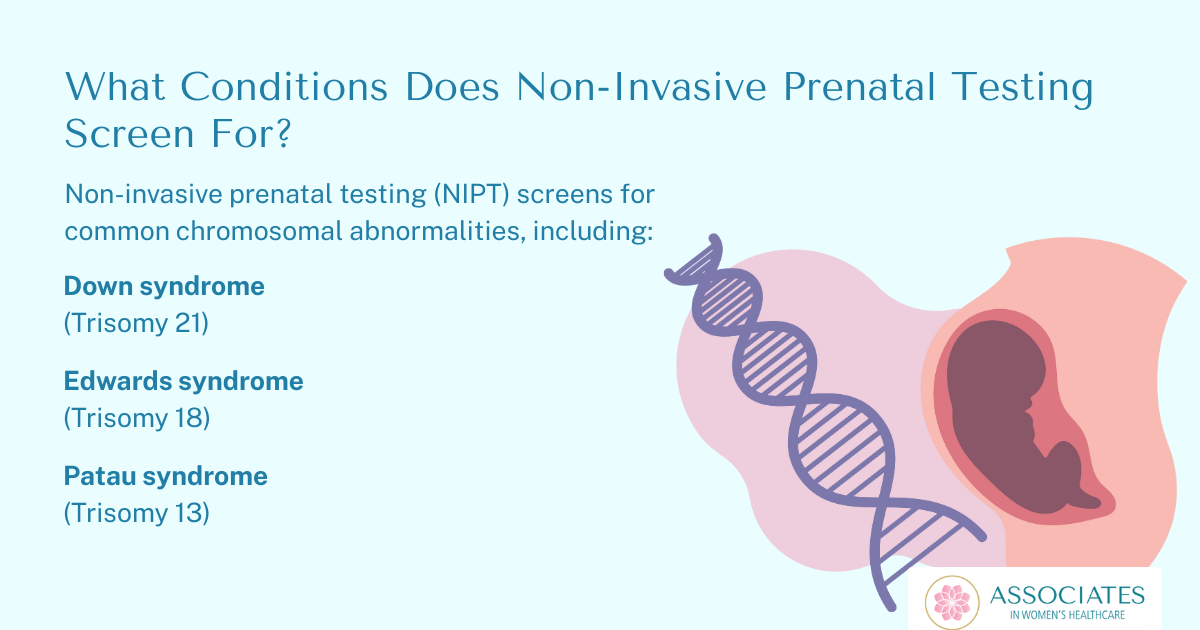3 Things We Can Discover Through Non-invasive Prenatal Testing
Pregnancy is a joyous occasion, but with that joy often comes concerns about the health of your developing baby. If you’re worried about the potential for chromosomal anomalies such as Down syndrome, non-invasive prenatal testing (NIPT) and other prenatal testing options can provide information about your baby’s risks for that and other genetic conditions.
In this article, we’ll discuss what non-invasive prenatal testing is and how it works and highlight some of the genetic conditions NIPT screens for.
What is Non-invasive Prenatal Testing (NIPT)?
Non-invasive prenatal testing is one of several types of genetic tests that screen for disorders that may affect your baby. Specifically, NIPT is a blood test performed as early as eight weeks of pregnancy that assesses the risk for common chromosomal abnormalities, including Down syndrome.
If you believe you’re in a high-risk pregnancy category, it’s important to get regular care from your OBGYN doctor and discuss screening or tests with them.
What’s the Difference Between Invasive and Non-invasive Prenatal Testing?
Non-invasive prenatal testing is done via drawing blood from the mother and does not pose risks to the mother or baby, and is therefore considered non-invasive.
Tests such as chorionic villus sampling (CVS), which involves taking a small sample of tissue from the placenta, and amniocentesis, in which a sample of the amniotic fluid surrounding the fetus is extracted, are considered invasive tests. This is because both of these procedures require a thin needle to be inserted through the mother’s abdomen or cervix in the case of CVS, and through the abdomen, in the case of amniocentesis.
What Conditions Can You Screen for During NIPT?

The test can also determine the sex of the baby.
NIPT doesn’t test for all chromosomal anomalies or disorders. The test also cannot definitively confirm whether the baby has a genetic condition. Instead, NIPT estimates whether there is an increased or decreased risk of certain chromosomal anomalies or conditions. Based on the results of the NIPT screening, your obstetrician may recommend diagnostic tests that can give a conclusive answer about specific conditions your baby may have.
How Do Non-invasive Prenatal Tests Work?
The NIPT test is performed after eight weeks into your pregnancy, once there is enough fetal DNA in the bloodstream. During the test, a sample of your blood, which contains fragments of this fetal DNA, is drawn from a vein in your arm and sent to a lab to be analyzed for genetic conditions and abnormalities in the baby’s DNA.
Because an NIPT test draws blood from the mother only, the test is safe and does not pose any risks to the baby.
Non-invasive prenatal testing is entirely optional.
How Accurate is Non-invasive Prenatal Testing?
NIPT is considered 99% accurate for detecting Down syndrome, but the accuracy may vary slightly for detecting trisomy 18 and trisomy 13. Other considerations that may affect NIPT results include twin or multiple pregnancies, pre-existing obesity, or being a surrogate.
Our caring professionals at Associates in Women’s Healthcare can help you understand more about screening accuracy and the genetic conditions NIPT screens for.
Not Sure if Non-invasive Prenatal Testing is Right for You? Our OBGYNs in Raleigh Are Ready to Answer Your Questions
The NIPT test is a personal choice, and you may wonder if the screening is right for you.
Whether you’re considering this test or other kinds of genetic testing during pregnancy, we invite you to contact us. Our dedicated professionals are here to support you in making the right decision for the health of you and your baby.
We can help you understand the prenatal testing options available and give you the information you need to make an informed decision.
Sources:
- The Cleveland Clinic:
https://my.clevelandclinic.org/health/diagnostics/21050-nipt-test - National Library of Medicine:
https://medlineplus.gov/genetics/understanding/testing/nipt/
The content within this article and others on this website is only for educational purposes and should not be considered as medical advice. For any questions or concerns, please consult with your healthcare provider.





